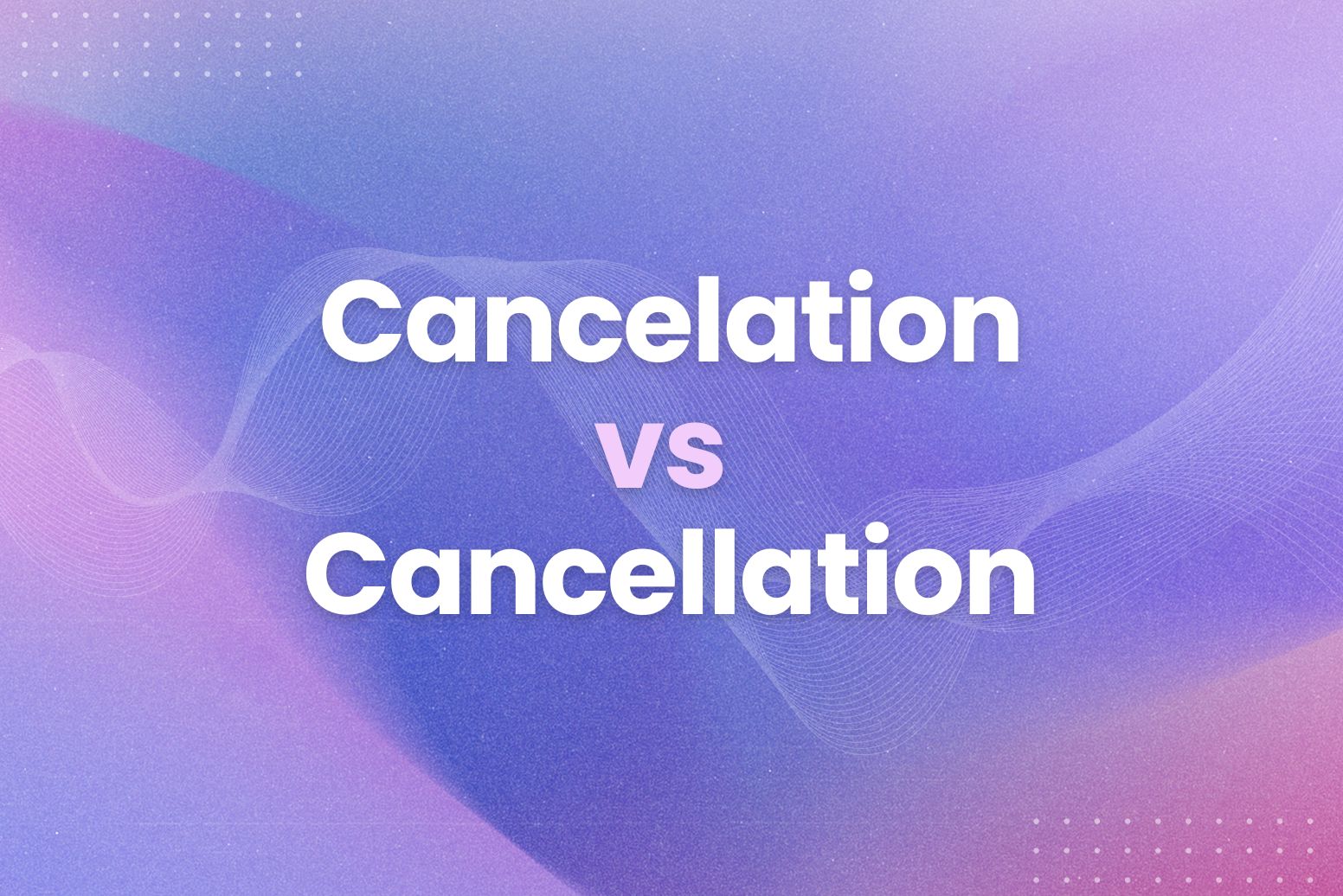Spelling can be tricky. One tiny letter can make a big difference. For instance, think about “Cancelation vs Cancellation.” They look almost identical, but only one is correct (depending on where you live). This common spelling pitfall trips up even seasoned writers.
So, if you’ve ever paused mid-sentence, wondering which version to use, you’re in the right place. This post will clear up the cancelation vs. cancellation confusion once and for all. In short, we’ll cover:
- The American English spelling (and why it’s different).
- The British English spelling (and its historical roots).
- A quick trick to remember which one to use.
The American English Spelling (and Why It’s Different)
In the United States, we generally use the single “l” spelling: cancelation. Therefore, you’ll see “cancelation fee,” “ticket cancelation,” and “cancelation policy” in American contexts. This applies to related words, too. For instance, “canceled” and “canceling” also use one “l.”
But why the difference? It comes down to a bit of linguistic history. Over time, American English has often simplified spellings. In other words, we’ve dropped extra letters to make words shorter and, some might argue, easier to read. This simplification process is why we have “color” instead of “colour” and “center” instead of “centre.” Similarly, this trend applies to “cancelation.”
This simplification makes sense from a practical standpoint. For example, think about how much time you save by typing one less letter repeatedly. It may seem small, but it adds up. Moreover, this streamlined approach reflects the American preference for efficiency.
Pro Tip: If you’re writing for a primarily American audience—whether it’s for a website, blog, or business correspondence—stick with the single “l” spelling. This ensures your writing looks professional and avoids any potential confusion. Furthermore, using the correct spelling shows attention to detail.
The British English Spelling (and Its Historical Roots)
Across the Atlantic, in the United Kingdom and other Commonwealth countries, the preferred spelling is cancellation—with two “l”s. Therefore, you’ll find “cancellation of services,” “booking cancellation,” and “cancellation form” in British English texts. Likewise, “cancelled” and “cancelling” also double the “l.”
So, why the extra letter? It’s largely due to a difference in how American and British English evolved over time. In short, British English often holds onto older spellings, preserving the roots of words. This means they often keep more letters, reflecting earlier forms of the language. For instance, words like “colour,” “centre,” and “programme” maintain spellings closer to their French or Latin origins. Similarly, “cancellation” keeps the double “l” from its etymological roots.
This is a good example of how language can reflect history. Furthermore, these spelling differences offer a glimpse into the different paths that English took on either side of the ocean. In addition, these differences can be a source of amusement—or confusion—for people learning English.
Pro Tip: If you’re writing for a British audience, using the double-“l” spelling is essential. This shows you understand their language conventions and helps your writing appear credible. Moreover, using the correct spelling builds trust with your readers.
Arvin Can Help with Regional Spelling
Arvin, our AI-powered browser extension, can be a lifesaver when dealing with regional spelling variations. For example, if you’re writing for a British audience, you can set Arvin’s language settings accordingly.
So, Arvin will flag the single “l” spelling of “cancelation” and suggest the correct British English version, ensuring your writing is appropriate for your target audience. This is just one of the ways Arvin makes writing easier.
A Quick Trick to Remember Which One to Use (Cancelation vs Cancellation)
Remembering which spelling to use can feel like a grammar brain teaser. But fear not. We have a simple trick. This will help you keep “cancelation” and “cancellation” straight.
Think of it this way: America has one “l” in its spelling of “cancelation.” This is a simple association. Therefore, if you’re writing for an American audience, remember the A and the one “l.”
On the other hand, Britain has two “l”s in “cancellation.” This is another easy way to remember. Hence, if your audience is British, use the B and the two “l”s.
This little mnemonic device can be a lifesaver when you’re in a hurry. For instance, if you’re quickly drafting an email, this trick should help you choose the correct spelling without hesitation. Furthermore, it’s a handy tool to teach others who struggle with this common spelling difference.
Never Let Spelling Cancel Your Confidence (Arvin Can Help)
The difference between cancelation vs cancellation boils down to regional spelling conventions. American English prefers the single “l,” while British English uses the double “l.” In short, remember the America/one l and Britain/two ls trick.
Key takeaways on cancelation vs cancellation
- American English uses “cancelation” (one “l”).
- British English uses “cancellation” (two “l”s).
- Use this guide to ensure your writing is appropriate for your target audience.
Writing with confidence means getting the details right. Arvin is there to give you that extra boost. For instance, whether you’re crafting an important email, writing a blog post, or just jotting down notes, Arvin can help you avoid spelling slips and write with clarity. It’s like having a personal proofreader available on any webpage.
FAQs
Is it cancellation or cancelation?
It depends on where your audience is. Therefore, if you’re writing for an American audience, use “cancelation.” On the other hand, if you’re writing for a British audience, use “cancellation.”
Is it cancellation or cancelation in Canada?
Canadian English generally follows British English conventions. Consequently, “cancellation” (with two “l”s) is the preferred spelling in Canada.
How do you spell cancellation in Australia?
Like Canada, Australia also typically follows British English spelling. In short, “cancellation” (with two “l”s) is correct in Australia.
Does cancel have one L or two?
“Cancel” itself only has one “l.” However, when adding suffixes like “-ing,” the spelling can change depending on the regional variation. Therefore, in American English, it becomes “canceling,” while in British English, it’s “cancelling.”






